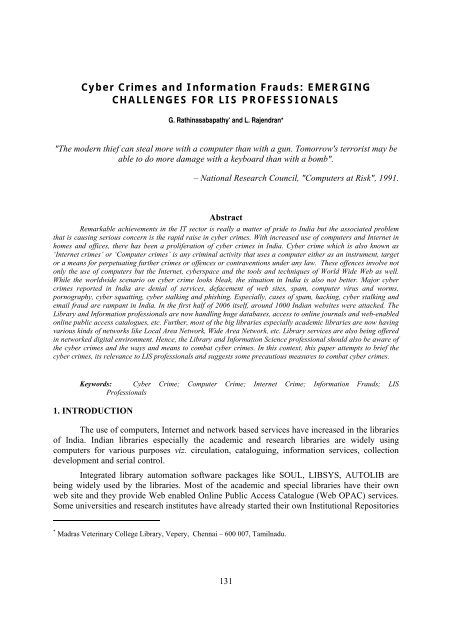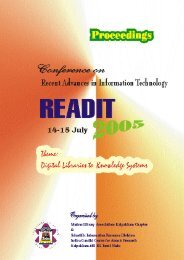READIT-2007 - Indira Gandhi Centre for Atomic Research
READIT-2007 - Indira Gandhi Centre for Atomic Research
READIT-2007 - Indira Gandhi Centre for Atomic Research
Create successful ePaper yourself
Turn your PDF publications into a flip-book with our unique Google optimized e-Paper software.
Cyber Crimes and In<strong>for</strong>mation Frauds: EMERGING<br />
CHALLENGES FOR LIS PROFESSIONALS<br />
G. Rathinasabapathy * and L. Rajendran*<br />
"The modern thief can steal more with a computer than with a gun. Tomorrow's terrorist may be<br />
able to do more damage with a keyboard than with a bomb".<br />
– National <strong>Research</strong> Council, "Computers at Risk", 1991.<br />
Abstract<br />
Remarkable achievements in the IT sector is really a matter of pride to India but the associated problem<br />
that is causing serious concern is the rapid raise in cyber crimes. With increased use of computers and Internet in<br />
homes and offices, there has been a proliferation of cyber crimes in India. Cyber crime which is also known as<br />
‘Internet crimes’ or ‘Computer crimes’ is any criminal activity that uses a computer either as an instrument, target<br />
or a means <strong>for</strong> perpetuating further crimes or offences or contraventions under any law. These offences involve not<br />
only the use of computers but the Internet, cyberspace and the tools and techniques of World Wide Web as well.<br />
While the worldwide scenario on cyber crime looks bleak, the situation in India is also not better. Major cyber<br />
crimes reported in India are denial of services, defacement of web sites, spam, computer virus and worms,<br />
pornography, cyber squatting, cyber stalking and phishing. Especially, cases of spam, hacking, cyber stalking and<br />
email fraud are rampant in India. In the first half of 2006 itself, around 1000 Indian websites were attacked. The<br />
Library and In<strong>for</strong>mation professionals are now handling huge databases, access to online journals and web-enabled<br />
online public access catalogues, etc. Further, most of the big libraries especially academic libraries are now having<br />
various kinds of networks like Local Area Network, Wide Area Network, etc. Library services are also being offered<br />
in networked digital environment. Hence, the Library and In<strong>for</strong>mation Science professional should also be aware of<br />
the cyber crimes and the ways and means to combat cyber crimes. In this context, this paper attempts to brief the<br />
cyber crimes, its relevance to LIS professionals and suggests some precautious measures to combat cyber crimes.<br />
Keywords: Cyber Crime; Computer Crime; Internet Crime; In<strong>for</strong>mation Frauds; LIS<br />
Professionals<br />
1. INTRODUCTION<br />
The use of computers, Internet and network based services have increased in the libraries<br />
of India. Indian libraries especially the academic and research libraries are widely using<br />
computers <strong>for</strong> various purposes viz. circulation, cataloguing, in<strong>for</strong>mation services, collection<br />
development and serial control.<br />
Integrated library automation software packages like SOUL, LIBSYS, AUTOLIB are<br />
being widely used by the libraries. Most of the academic and special libraries have their own<br />
web site and they provide Web enabled Online Public Access Catalogue (Web OPAC) services.<br />
Some universities and research institutes have already started their own Institutional Repositories<br />
* Madras Veterinary College Library, Vepery, Chennai – 600 007, Tamilnadu.<br />
131

















